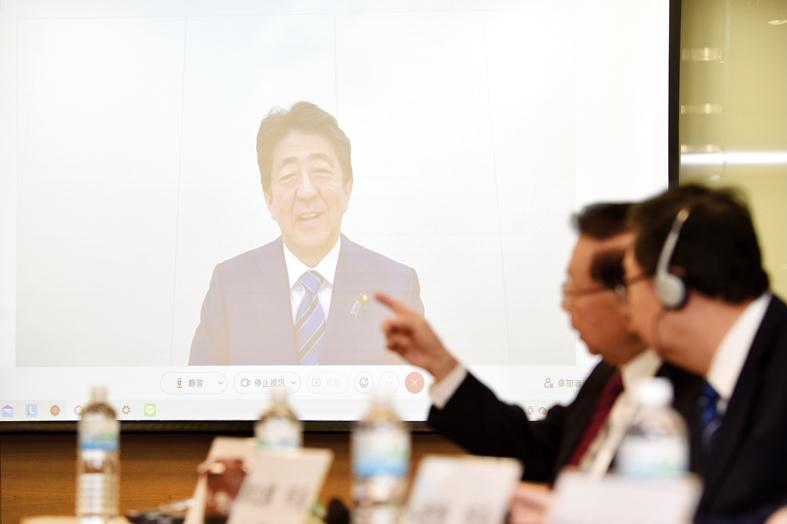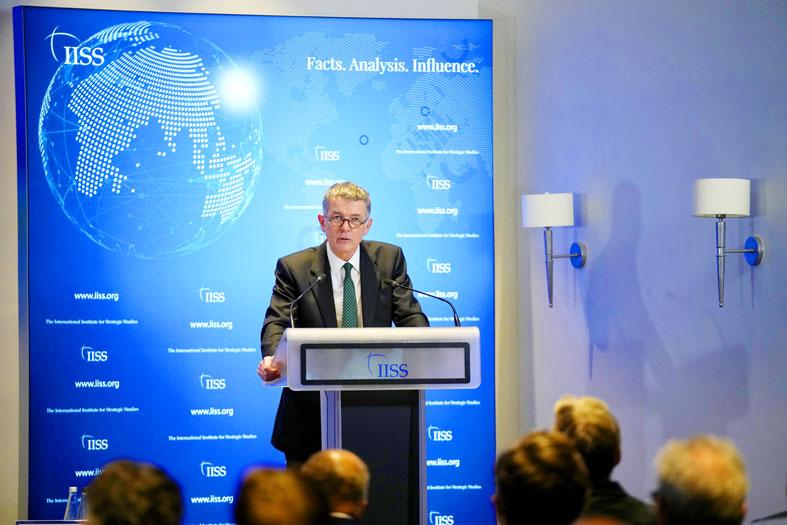Japan and the US could not stand by if China attacked Taiwan, and Beijing needs to understand this, former Japanese prime minister Shinzo Abe said yesterday.
Speaking virtually to a forum organized by Taiwanese think tank the Institute for National Policy Research, Abe said that the Senkaku Islands — known as the Diaoyutai Islands (釣魚台) in Taiwan — the Sakishima Islands and Yonaguni Island are only about 100km from Taiwan.
An invasion of Taiwan would be a grave danger to Japan, he said.

Photo: Peter Lo, Taipei Times
“A Taiwan emergency is a Japanese emergency, and therefore an emergency for the Japan-US alliance. People in Beijing, [Chinese] President Xi Jinping (習近平) in particular, should never have a misunderstanding in recognizing this,” Abe said.
Abe called on the democratic world to prevent a Chinese invasion by standing together and jointly urging Xi and the Chinese Communist Party “not to choose the wrong path.”
“A stronger Taiwan, a thriving Taiwan, and a Taiwan that guarantees freedom and human rights are also in Japan’s interests. Of course, this is also in the interest of the whole world,” Abe said.

Photo: AP
A military action targeting Taiwan would also lead to “economic suicide” for China, despite it being one of the world’s top economies, and significantly affect the global economy given China’s close economic and trade ties with the rest of the world, he added.
That is why maintaining peace across the Taiwan Strait is in the interest of all parties involved, he said.
Abe reiterated his support for Taiwan’s bid to join the Tokyo-led international trade bloc, the Comprehensive and Progressive Agreement for Trans-Pacific Partnership (CPTPP).
During his tenure as prime minister, Abe said he tried to expand Japan’s strategic economic, security and diplomatic standing in the world order, and saw the need to “firmly connect ourselves to a free and open democratic framework.”
“Based on the same idea, I support Taiwan’s participation in the TPP,” he said, using the CPTPP’s former name, the Trans-Pacific Partnership, to refer to the trade bloc.
“The role of the TPP in maintaining and strengthening the rules-based international order is important. Taiwan is more than qualified to participate,” he said.
On Tuesday in London, British Secret Intelligence Service Chief Richard Moore told an event organized by the International Institute for Strategic Studies: “The Chinese Communist Party leadership increasingly favors bold and decisive action on national security grounds. The days of [former Chinese leader] Deng Xiaoping’s (鄧小平) ‘hide your strength, bide your time’ are over.”
“Beijing believes its own propaganda about Western frailties and underestimates Washington’s resolve. The risk of Chinese miscalculation through overconfidence is real,” Moore said, without mentioning Taiwan explicitly.
The MI6 head warned about the spread of Chinese surveillance technology, which he said was used in “targeting the Uighur population in Xinjiang,” and said the UK needed to recognize that “technologies of control are being increasingly exported to other governments.”
Moore said that “adapting to a world affected by the rise of China is the single-biggest priority for MI6.”
Additional reporting by the Guardian

AGING: As of last month, people aged 65 or older accounted for 20.06 percent of the total population and the number of couples who got married fell by 18,685 from 2024 Taiwan has surpassed South Korea as the country least willing to have children, with an annual crude birthrate of 4.62 per 1,000 people, Ministry of the Interior data showed yesterday. The nation was previously ranked the second-lowest country in terms of total fertility rate, or the average number of children a woman has in her lifetime. However, South Korea’s fertility rate began to recover from 2023, with total fertility rate rising from 0.72 and estimated to reach 0.82 to 0.85 by last year, and the crude birthrate projected at 6.7 per 1,000 people. Japan’s crude birthrate was projected to fall below six,

US President Donald Trump in an interview with the New York Times published on Thursday said that “it’s up to” Chinese President Xi Jinping (習近平) what China does on Taiwan, but that he would be “very unhappy” with a change in the “status quo.” “He [Xi] considers it to be a part of China, and that’s up to him what he’s going to be doing, but I’ve expressed to him that I would be very unhappy if he did that, and I don’t think he’ll do that. I hope he doesn’t do that,” Trump said. Trump made the comments in the context

SELF-DEFENSE: Tokyo has accelerated its spending goal and its defense minister said the nation needs to discuss whether it should develop nuclear-powered submarines China is ramping up objections to what it sees as Japan’s desire to acquire nuclear weapons, despite Tokyo’s longstanding renunciation of such arms, deepening another fissure in the two neighbors’ increasingly tense ties. In what appears to be a concerted effort, China’s foreign and defense ministries issued statements on Thursday condemning alleged remilitarism efforts by Tokyo. The remarks came as two of the country’s top think tanks jointly issued a 29-page report framing actions by “right-wing forces” in Japan as posing a “serious threat” to world peace. While that report did not define “right-wing forces,” the Chinese Ministry of Foreign Affairs was

PREPAREDNESS: Given the difficulty of importing ammunition during wartime, the Ministry of National Defense said it would prioritize ‘coproduction’ partnerships A newly formed unit of the Marine Corps tasked with land-based security operations has recently replaced its aging, domestically produced rifles with more advanced, US-made M4A1 rifles, a source said yesterday. The unnamed source familiar with the matter said the First Security Battalion of the Marine Corps’ Air Defense and Base Guard Group has replaced its older T65K2 rifles, which have been in service since the late 1980s, with the newly received M4A1s. The source did not say exactly when the upgrade took place or how many M4A1s were issued to the battalion. The confirmation came after Chinese-language media reported